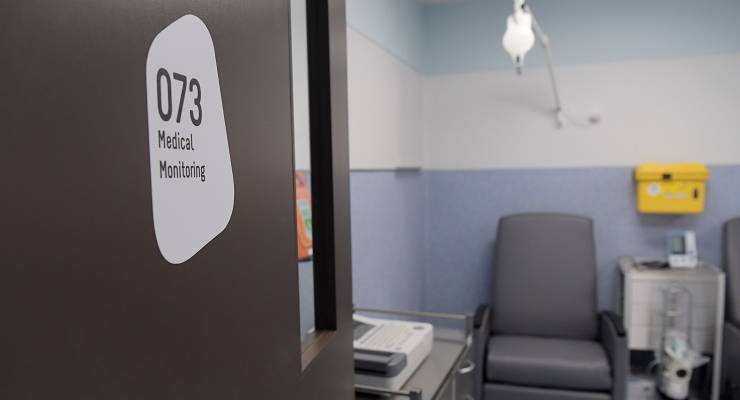
Safe injecting rooms have always been a polarising topic, but the research is unequivocal: they save lives. In the two years since Melbourne’s first safe injecting room opened in North Richmond, 3200 overdoses have been successfully managed, and there have been no deaths.
The demand has been so great that last week Premier Dan Andrews announced a proposal for a second one, near the Queen Victoria Market.
The research was of little interest to the wizened creature who bailed me up last weekend in the park. She was 4 foot 11 tops, but I was seated sipping my latte so she was in the ascendancy. Determined to share her thoughts with a complete stranger, she began by excoriating Andrews, before moving on to the evils of safe injecting rooms.
“Waste of taxpayers’ money.”
“But they save lives,” I meekly interjected.
“Bah, they’re just junkies. They make their choices. It’s their fault. They’re good-for-nothings, so who cares if they die?” So it continued until I feigned the need to check on my (non-existent) dog.
Confronting though I found her views, I know she’s not alone. It’s easy to see people in the grip of addiction, motivated by nothing other than the next hit, as worthless victims of their lousy choices.
Easy, but that view is also a choice. And it seems people are prone to make bad choices.
After more than 30 years on the front line in St Kilda, I’ve met my share of junkies. Back in the heroin-glut days, overdoses were common and the antidote, naloxone, was always close by.
I used to be called out on a regular basis to someone comatose on the footpath or in the nearby park. Once it was two blokes who’d shot up after work, then started driving home. The driver was OK but his mate in the passenger seat was blue and unresponsive.
The trick was to get the naloxone in and stand well back as the response on waking was unpredictable. Confusion and agitation were normal, violence not uncommon. Only once did someone say thanks.
I’ve been threated any number of times. Memorably a 6 foot 3 heroin-addicted prostitute who, when I refused an opiate script, leaned over my desk and opined: “If I had a knife, I’d slit your fuckin’ throat.”
No doubt about it, their behaviour can be appalling. But the important word here is behaviour. We tell parents to address their kids’ behaviour rather than their character. Not “Johnny, you are a total shit” — rather, “Johnny, eating your little sister’s goldfish was a very bad thing to do.”
My experience of drug users is that they are just like anyone else: mostly good people and a few who actually are total shits. Just like the Johnnys of this world.
Addiction might be triggered by abuse, abandonment or disruption, but it can also happen to anyone. I’ve seen loving professional families where one of the children made some “bad choices”, good kids who choose the wrong friends.
I’ve also seen it the other way around — a senior health professional who managed to get into a medical degree despite both parents being addicts.
Crucially, addicts who manage to get clean become, in my experience, some of the most productive, compassionate members of society.
We’ve all made bad choices along the way and most of us have been lucky enough to survive despite them. Let’s not condemn those who weren’t so lucky.







Thank you Nick. As you say, we make choices about who we save, who we value, who we discard. What is it about addiction? Why is it we can’t see “addicts” as worthy of a range of treatment options, just like other people suffering a health crisis? But also, Dan Andrews, can we turn our energies to also providing better support services in non-judgmental readily available medical clinics, rehabilitation services and perhaps, Lord help us all, getting the drugs off the street and into pharmacies by way of opiate replacement therapy? Jen CBD
One of those eye-opening things about human behaviour is how much moral condemnation gets in the way of genuine harm reduction policies. Trying to minimise the harm for drug users and their wider effect on society doesn’t take away anyone’s conviction that drug users ought to be condemned, it just recognises that such condemnation isn’t itself a good solution to dealing with the harms that exist in society.
Thanks Nick – no relation to Bob? Heartfelt, compassionate and based on experience, sadly, all the factors that seem to take a issue nowhere these days.
Any account I’ve read since the Kings Cross injecting rooms were started in the ‘90’s, from those working there – medical, health and social workers – are in favour of the benefits it provides addicts and society.
We even have ex-police commissioners coming out and stating injecting rooms should be a part of implementing a whole new approach to drugs. That news gets a radar blip of attention until journalists meet their corporate obligations and ensure they get across the next breaking story.
Sadly, random perusal of organised crime accounts, journalist and political memoirs point to ingrained corruption throughout the judiciary and politics.
Safe injection rooms are one factor in a new approach to our decades old drug problem, where it obvious traditional approaches have failed.
Where is the will to seriously implement a new approach, using medical, health and police experts to help define policy?